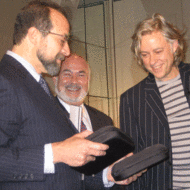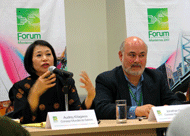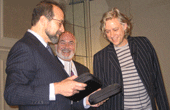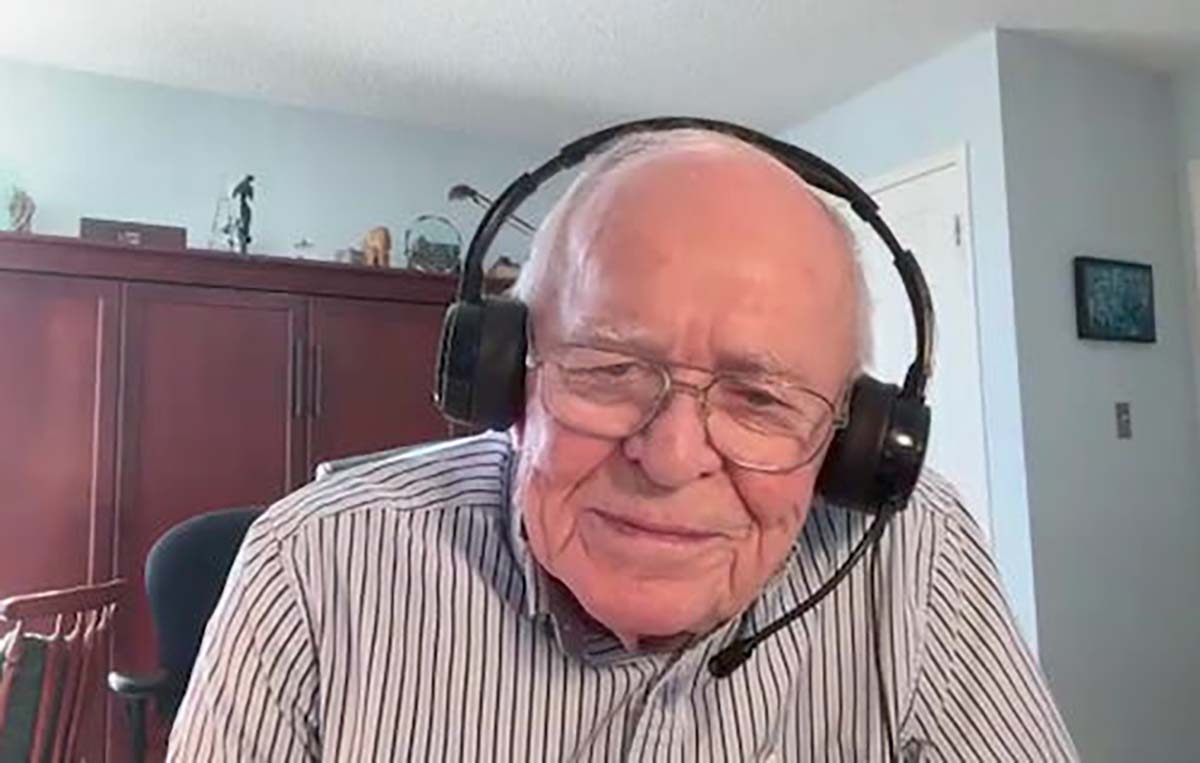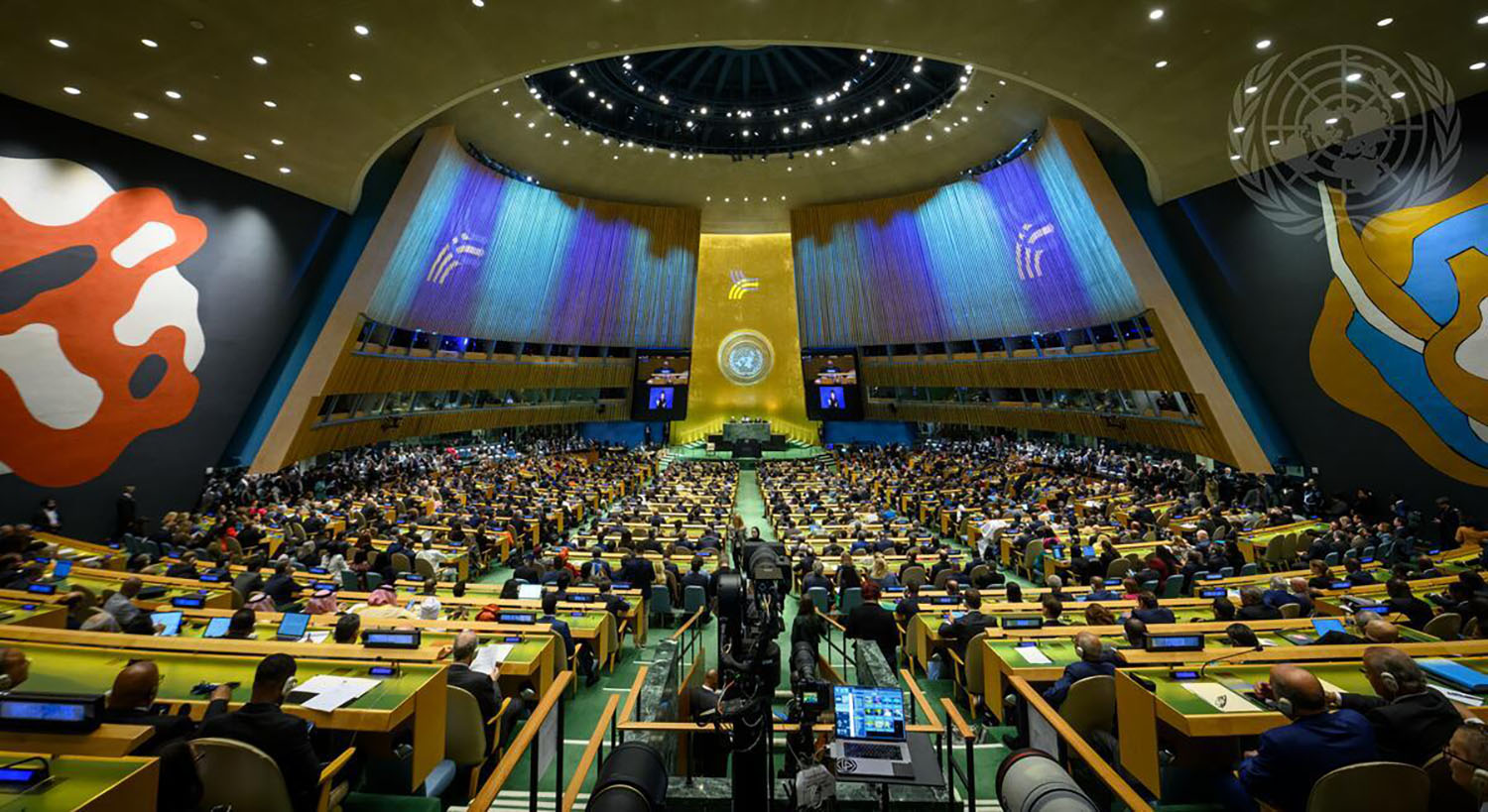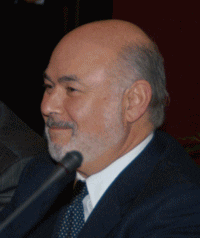 |
|
A Message from the President
Those of us who vigorously advocate for a nuclear weapon-free world are often thought to ignore positive efforts of nuclear weapon states. Let us put that to rest. Here is a short list of several noteworthy accomplishments of the United States.
– A 146% increase in dismantled nuclear weapons over the previous year’s rate;[1]
– The elimination of over 3,000 tactical nuclear warheads, as outlined by the 1991 Presidential Nuclear Initiative which was finished in 2003; [2]
– The removal of 374 metric tons of highly enriched uranium (HEU) and 59 metric tons of plutonium from defense stockpiles, with the intention of down-blending to low-enriched reactor fuel; [3]
– Funding over 50,000 Soviet weapons scientists to allow them to engage in peaceful work; [4]
– Reaching the National Nuclear Security Administration’s goal to increase rate of dismantlement of retired weapons by 50% four months early; [5]
– The removal of four ballistic missile submarines from service as well as thousands of missiles and 450 silos; [6]
– Declared 174 metric tons of HEU and 52 metric tons plutonium to be surplus, announced it would remove an additional 200 metric tons of HEU; [7]
The US Special Representative for Nuclear Nonproliferation, Dr. Christopher Ford, in a sophisticated presentation to the 19th Annual UN Conference on Disarmament Issues in Sapporo, Japan, in August of 2007, analyzed the security and moral context of nuclear disarmament advocacy. His tone reflects a recently much improved attitude of government officials to the pleas for increased progress on nuclear weapons elimination advanced by informed people the world over. He concluded:
“A sustained and serious effort to think practically and realistically about the challenges of disarmament is itself, I submit, a moral imperative. As the feminist theorist Jean Bethke Elsthain has suggested, it is indefensible to proclaim “‘solutions’ that lie outside the reach of possibility.” Such proposals do not represent progress at all, for they “covertly sustain business as usual” by merely pretending to present alternatives. Today, it falls to officials, experts, activists, and academics such as ourselves to study carefully how we might make nuclear disarmament a realistic, practical, and desirable alternative to a nuclear-armed world. This is a formidable challenge, and it is perhaps not a foregone conclusion that disarmament can be achieved. Such serious study, however, is a challenge from which we dare not shrink.”
The programs of GSI are designed to meet that challenge. Our advocacy is focused on lowering the political currency of nuclear weapons– thus enhancing security– fulfilling existing legal obligations, and providing confidence through verification. Each policy we support must stand on its own merits and decrease risks of use, diminish the access of terrorists to catastrophic weapons and materials to build them, and strengthen nonproliferation. These standards help set forth a realistic path to nuclear abolition. The practical steps are known but the core problem is simple. The nuclear weapon states have not fully come to grips with their fundamental dilemma: they want to keep their nuclear weapons indefinitely and at the same time condemn others who would attempt to acquire them.
Because of this contradiction, even the cuts lauded above are not irreversible nor adequately verifiable. We believe that there is no substitute for negotiated, internationally legally-binding and irreversible verifiable reductions. Such steps alone can substantiate claims of good faith compliance with disarmament obligations under existing treaties.
I hope you find this report on GSI’s activities encouraging. As a relatively modest civil society institution, our programs are designed to strategically contribute to effectively move the status quo from an irrational reliance on unacceptable risks to a realistic path filled with hope.

Jonathan Granoff
President, Global Security Institute
[1] https://www.nnsa.doe.gov/docs/newsreleases/2007/PR_2007-10-01_NA-07-44.htm
[2]https://www.armscontrol.org/factsheets/pniglance.asp#Note4
[3] https://www.armscontrol.org/act/2006_09/downblending.asp
[4] https://www.fcnl.org/issues/item.php?item_id=531&issue_id=77
[5] https://www.nnsa.doe.gov/docs/newsreleases/2007/PR_2007-06-07_NA-07-23.htm
[6] https://www.milnet.com/pentagon/usnship.htm; https://archives.cnn.com/2000/US/07/05/silo.implosion.02/index.html; https://www.reachingcriticalwill.org/legal/npt/shadowreport/USA.pdf
[7] https://www.globalsecurity.org/wmd/library/news/usa/2005/usa-051108-usia01.htm
Contents: (click to jump)
![]()
Parliamentarians for Nuclear Nonproliferation and Disarmament activities
Five Women Leaders elected Co-Presidents of PNND
 |
|
PNND Co-Presidents Alexa McDonough and Marian Hobbs speaking at the United Nations |
On October 12, five leading women parliamentarians from the global north and south were elected to be the inaugural Co-Presidents of the Parliamentary Network for Nuclear Disarmament (now called Parliamentarians for Nuclear Nonproliferation and Disarmament- see story below). Alexa McDonough (Canada), Marian Hobbs (Aotearoa-New Zealand) LEE Mikyung (South Korea), Uta Zapf (Germany) and Senator Abacca Anjain Madisson (Marshall Islands) will lead this emerging force of 500 legislators from over 70 countries in global parliamentary initiatives to prevent nuclear proliferation and advance nuclear disarmament.
» Read more about the outstanding accomplishments and achievements of each of the five Co-Presidents
The Co-Presidents replace Senator Emeritus Douglas Roche, who founded PNND and served as its interim Chair until now. PNND thanks Senator Roche for his leadership and in bringing PNND to this new stage of its growth and development.
UN Panel Event: Amplifying the Moral and Practical Missions of the United Nations: Parliamentarians, Diplomats and Engaged Citizens Working to Abolish Nuclear Weapons
 |
“What’s a model have to do with nuclear weapons?” asked Christie Brinkley, speaking at a panel event on the subject at the United Nations on October 11.
Ms. Brinkley, however, is not just a model, or even a supermodel. She was one of the engaged, informed, and empowered women speaking at a special panel event hosted by GSI and PNND entitled “Amplifying the Moral and Practical Missions of the United Nations: Parliamentarians, diplomats and engaged citizens working to abolish nuclear weapons.”
Joining the American cultural icon on the panel was the Hon. Marian Hobbs, parliamentarian and former Minister for Disarmament of New Zealand, Ms. Cora Weiss, a longtime peace activist and leader for gender equality at the UN, and the Hon. Alexa McDonough, a senior member of the Canadian parliament. Moderated by GSI Senior Officer, Rhianna Tyson, the event brought together women who are working on all levels to prevent conflict involving nuclear weapons.
» Read the full event report
» Watch a video of the event
» Watch the clip that aired on NBC
» View the photo gallery
» Check out the full listing of media coverage, from Fox News to the International Herald Tribune
» Read the full text of Christie Brinkley’s statement
» Read the full text of Cora Weiss’s statement
» Read Rhianna Tyson’s introduction
Preventing Nuclear Genocide – PNND address by Senator Roméo Dallaire, former Commander of the UN Forces in Rwanda
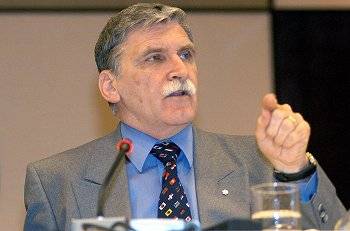 |
||
PNND Special Representative Senator Romeo Dallaire |
On October 12, PNND hosted a special luncheon in New York in honor of Senator Roméo Dallaire’s appointment as PNND Special Representative, with the mandate to publicize the human rights and humanitarian imperative for nuclear abolition and promote cross-party action for its achievement.
Senator Dallaire’s address, Preventing Nuclear Genocide, delivered by Kim Kroeber, highlighted the “serious and immediate threat which faces each and every one of us today. Of course I am speaking about the 26,000 nuclear weapons, thousands of which are ready to launch in under 30 minutes.”
Dallaire lamented that, “Most people think the subject matter is beyond their comprehension and control. This is, after all, the domain of nuclear physics and rocket science. The truth is that the basic underlying moral issue is quite straight forward and understandable by all. We must strip down the technical language and make the foundational issue clear to all.”
“Nuclear weapons are inherently evil. They are designed to attain a single goal: to cause the most massive annihilation of innocent civilians possible. They are the ultimate tool of genocide. They have no place in a truly civilized world which values life and human rights. They must be abolished.”
» Read the Senator’s full speech, Preventing Nuclear Genocide
PNND Presentation at the 19th United Nations Conference on Disarmament Issues, Sapporo, Japan
PNND Global Coordinator Alyn Ware again participated in the UN Conference on Disarmament Issues, held in Sapporo City, Japan, August 27- 29, held under the auspices of the United Nations Department for Disarmament Affairs and the United Nations Regional Center for Peace and Disarmament in Asia and the Pacific in cooperation with the Hokkaido Prefectural Government, Sapporo City, and the Ministry of Foreign Affairs.
The conference, entitled “New Vision and Required Leadership towards a World free from Nuclear Weapons and Other Weapons of Mass Destruction,” discussed issues including the nuclear non-proliferation regime, nuclear programs of North Korea and Iran, nuclear black market, multinational efforts for nuclear disarmament and non-proliferation.
In his presentation, entitled “Nuclear disarmament: Views and efforts of NGOs,” Mr. Ware likened the efforts to abolish nuclear weapons to that of Mr. William Wilberforce whose 18th century efforts to abolish the slave trade were easily defeated and mocked as dangerous to Britain’s economic and political security. This perception was as ill-fitting to the immoral slave trade as it is to our present day immorality of retaining, using or threatening to use nuclear weapons.
» Click here for the full text of Mr. Ware’s remarks
“Books not Bombs,” International Peace Bureau seminar in Alexandria, Egypt
 |
|
L-R: GSI/MPI Adviser Jayantha Dhanapala, PNND Global Coordinator Alyn Ware and Ms. Frida Berrigan of the New America Foundation at the International Peace Bureau seminar, “Books or Bombs,” Alexandria, Egypt, November 11-12, 2007 |
|
Every year the Nobel Laureate organization the International Peace Bureau (IPB) organizes a seminar, together with business meetings and the Sean MacBride Peace Prize ceremony. This year’s seminar, held at the prestigious Bibliotheca Alexandria and in cooperation with the Peace Studies Institute in Alexandria, Egypt, was entitled “Books or Bombs? Sustainable Disarmament for Sustainable Development.” PNND Global Coordinator and IPB Vice-President Alyn Ware chaired a panel featuring Ambassador Jayantha Dhanapala, MPI Expert Consultant and GSI Advisory Board member and Ms. Frida Berrigan, New America Foundation’s Arms and Security Initiative.
» Click here for more information on the International Peace Bureau
» Click here for the opening remarks by IPB President Tomas Magnusson
At the October 12 meeting, the PNND Global Council decided to endorse the proposal to change the name of the network from Parliamentary Network for Nuclear Disarmament to Parliamentarians for Nuclear Nonproliferation and Disarmament. The proposal, which was circulated to all PNND Members in July and received no opposition, was made in order to eliminate a misconception from some key countries that ‘disarmament’ refers only to unilateral disarmament measures and does not include the wider range of nonproliferation and multilateral disarmament measures (see attached memo).
It will take some time for the PNND secretariat to operationalize the name change, i.e. to update stationery, documents, promotional materials and the website. We plan to complete the transition by January 1, 2008. In the meantime, PNND members are welcome to use either name for the network.
PNND Update 19 now available in English, Spanish and Arabic
PNND Update No. 19 (October-November, 2007) is now available online, in English, Spanish and Arabic.
Replete with photos, links to reports and other multimedia, Update 19 includes information for and about parliamentarians working for disarmament and non-proliferation, such as:
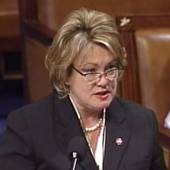 |
US Congresswoman
|
– New Zealand’s Minister for disarmament Phil Goff, who launched a new international initiative calling for a stand-down of all nuclear forces;
– the Scottish Parliament’s adoption of a resolution rejecting the Triden replacement;
– the letter to the foreign ministers of the Nuclear Suppliers Group sent by US Congress members Ellen Tauscher (Chair of the House Subcommittee on Strategic Weapons), Ed Markey (Chair of the Bipartisan Task force on Nonproliferation) and Sam Farr (Member of the House Appropriations Committee), asking that their acceptance of the US-India deal should be contingent on entry-into-force of the Comprehensive Test Ban Treaty and a Fissile Materials Cut-Off Treaty;
and much more.
» Click here to read PNND Update No. 19 (or in Spanish, or in Arabic)
» Click here to subscribe to receive PNND Updates
![]()
Middle Powers Initiative activities
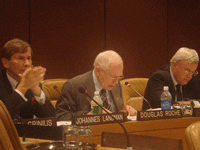 |
|
MPI Panel Towards 2010: Ambassador Johannes Landman, MPI Chairman Hon. Douglas Roche and Ambassador Don MacKay. Not pictured: Ambassador Marius Grinius |
MPI Panel event at the United Nations
On October 10, 2007, the Middle Powers Initiative (MPI) hosted a panel discussion at the United Nations entitled “Towards 2010: Priorities for NPT Consensus,” named after the MPI position paper distributed at the first session of the NPT Preparatory Committee meeting in Vienna in April 2007. The panel examined three of the seven priority issues identified in the paper: the Comprehensive Test Ban Treaty (CTBT), the Fissile Materials Cut-Off Treaty (FMCT), and de-alerting. The speakers were Ambassadors Marius Grinius of Canada, Johannes C. Landman of the Netherlands, and Don MacKay of New Zealand. The panel was chaired by the Hon. Douglas Roche, O.C., Chairman of MPI.
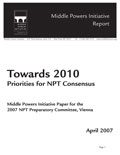 |
|
Grinius said the idea of an FMCT continues to be relevant. Since nuclear weapons cannot be produced without fissile material, international initiatives to restrict or eliminate the availability of such materials for weapons purposes is key to ending vertical and horizontal nuclear proliferation. He said the Conference on Disarmament made progress in 2007 on the best way to make progress in resuming productive work within the CD. Landman called the current moratoria on testing, adapted by many countries, to be a positive development, but insisted that a legally binding treaty was necessary to ensure the prevention of future testing. A universal legally-binding CTBT must be in operation, according to Landman, if the 2010 NPT Review Conference is to be a success. De-altering nuclear warheads is key to securing international peace, said MacKay. Highlighting a new initiative in the First Committee by New Zealand, Sweden, Chile, Nigeria, and Switzerland, he said a striking number of countries have shown concern regarding de-alerting issues in their statements at the CD and NPT PrepCom. MacKay insisted that “the time has come” for raising de-alerting as a priority.
» Read Towards 2010: Priorities for NPT Consensus
MPI seminar: “An International Sustainable Energy Agency”
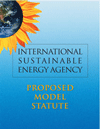 |
|
On September 26th, MPI hosted a panel at its New York offices of scientists and activists to discuss strategies for sustainable energy development. Two speakers – Dr. Jürgen Scheffran, Senior Research Scientist in the Program in Arms Control, Disarmament and International Security of the University of Illinois at Urbana-Champaign, and Mary Olson, the Director of the Southeast Office of Nuclear Information and Resource Service in Washington, DC – discussed sustainable energy technologies and tactics, including the establishment of an International Sustainable Energy Agency, as means to address climate change and counter the drive for more nuclear power plants.
Scheffran said even though the United States has made cuts in research and development in both the public and private sector, market forces have driven down the cost of wind power and other sustainable energy sources. Market forces have also driven down prices on solar panels which means, among other things, the technology can be funded through micro credit loans in Third World countries. Olsen pointed out that the recent rush to build nuclear reactors is a direct result of the massive subsidies signed by the Bush administration. She cited a study that said 1500 new nuclear plants would be needed to take a significant bite out of global warming, at $2-6 billion per plant, and speculated about what the money from one or two of those plants could do for the solar energy industry. The third speaker was Dr. Adele Buckley, a former chair of the Canadian Pugwash Group. She focused on a different strategy: how to adapt to the reality that countries will use nuclear power, rather than attempting to completely eliminate nuclear power. She argued for a new treaty, separate from the NPT, to implement comprehensive safety, security and proliferation safeguards.
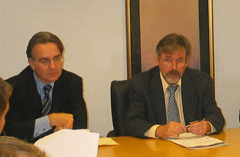 |
|
Gustavo R. Zlauvinen, Representative of the Director-General of the IAEA to the United Nations and Jim Wurst, MPI Program Director, on the MPI panel on “Challenges to the Nuclear Fuel Cycle” |
|
MPI seminar: “Fuel Cycle Challenges to the Disarmament/Nonproliferation Regime “
There is increasing awareness that as more nations seek domestic control of all aspects of the nuclear fuel cycle, this quest could be the “Achilles’ Heel” of nuclear arms control because of the proliferation challenges inherent in the fuel cycle. There are numerous proposals on establishing fuel banks to address proliferation concerns and demands for nuclear power. On November 1st the Middle Powers Initiative presented a panel on the nuclear fuel cycle. Gustavo Zlauvinen, Representative of the Director General of the IAEA and Dr. John Burroughs, Executive Director of the Lawyers’ Committee on Nuclear Policy shed light on the complex connection between issues of the civil nuclear fuel cycle and the non-proliferation of nuclear weapons.
Zlauvinen noted that if a nuclear renaissance evolves as anticipated, there will be a major new demand for nuclear reactors and fuel supply, which could lead to states deciding to develop their own national indigenous enrichment capabilities to secure the supply of nuclear fuel. To avert the proliferation dangers involved, he said the IAEA has been dealing for the past years with issues of nuclear fuel assurance. “The vision of the IAEA’s Director General is that enrichment and reprocessing over time should be exclusively under multilateral control,” he said. Burroughs said the idea of a fuel bank “appears to have some momentum,” however “as a means of preventing or discouraging the spread of fuel production capabilities,” it faces two problems: “for a country concerned about energy security and perhaps the potential, however remote, to produce nuclear weapons, the most reliable approach is having facilities on its own territory under its physical control;” and that the nuclear industry “opposes any fuel bank approach that would undermine the existing market.” This would mean a fuel bank would be an “afterthought to the real world of nuclear production and supply.”
MPI seminar: Confidence-building Measures Towards a Nuclear Weapon-Free Zone in the Middle East
Every year since 1993, the UN General Assembly has unanimously adopted a resolution calling for the establishment of a nuclear weapon free zone in the Middle East, however little has ever been done to follow up on this initiative. MPI sponsored a seminar on October 8th on “Confidence-building Measures Towards a Nuclear-Weapons-Free-Zone in the Middle East” with the goal of identifying confidence-building measures and other incremental steps that could lead to progress towards this common goal. The seminar heard from: Ambassador Yehia Al-Mahmasani, the Head of the UN Mission of the League of Arab States; Prof. Alon Ben-Meir, the Middle East Director of the World Policy Institute at The New School in New York; and Dr. Ben Sanders, the former Executive Chairman of the Program for Promoting Nuclear Non-Proliferation and former senior official of the UN disarmament secretariat. The session was chaired by the Hon. Douglas Roche, O.C., the Chairman of MPI.
Sanders, who was one of the authors of the UN 1989 study on a NWFZ in the Middle East, said recent events might have made a zone “both somewhat more possible but also more urgently needed.” Those factors include Israel’s interest in getting an India-style deal from the Nuclear Suppliers’ Group and some Arab countries which “seem to attach less credibility to the NPT” and may seek other means for security. Ben-Meir said among the key problems that set the Middle East off from other regions is that Israel has always seen an “existential threat” from its neighbors that can not be countered by traditional deterrence and that, on the other side, Arab state resent the double standard in place over the Israeli and Iranian nuclear programs. Al-Mahmasani said the Arab states “have taken many steps to prepare for” a NWFZ but that such a zone “should not be designed by one party.” All three speakers said that the United States must take a leadership role in settling these issues.
MPI Statement on Iran
On September 20, the Middle Powers Initiative issued a statement on the US/Iran confrontation, urging intensified diplomacy and adherence to international law.
Ambassadors Thomas Graham and Robert Grey, Chairman and Director of the Bipartisan Security Group, commended the “clear, powerful statement” as “a welcomed measure at this critical juncture.”
» Read the full text of the MPI statement
» Read the full text of the BSG message of support
MPI/GSI Reception for UN High Representative for Disarmament Affairs Sergio Duarte
 |
|
October 11 reception in the NY office, honoring the UN High Representative for Disarmament Affairs |
On October 11, the Middle Powers Initiative and the Global Security Institute hosted a reception in their New York office honoring the new UN High Representative for Disarmament Affairs, Ambassador Sergio Duarte.
Nearly 100 people in the peace and security community at the UN attended the evening reception, which was made possible with the help of our officemates at Global Action to Prevent War, the Lawyers Committee on Nuclear Policy, the Jane Goodall Institute and, of course, our generous landlords, Helena Durst and the Durst Organization. Special thanks also goes to GSI Board member Christina Sidoti, who helped enormously with the food and beverage donations.
MPI Chairman Launches New Book, Global Conscience
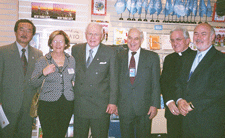 |
|
The launch at the UN Bookshop (left to right): USG Akasaka, Ms. Pat McGoey, Sen. Roche, High Representative Duarte, H.E. Archbishop Celestino Migliore, Apostolic Nuncio, Permanent Observer mission of the Holy See to the UN and Mr. Jonathan Granoff, President of the Global Security Institute. |
The Hon. Douglas Roche, O.C., Chairman of the Middle Powers Initiative, launched his 19th book, Global Conscience at successive events in Toronto, at the United Nations in New York and in Ottawa. In Toronto, the launch was held at Novalis headquarters, Senator Roche’s publisher, on October 3.
The UN event, held at the UN Bookshop on October 9, was attended by UN High Representative for Disarmament Sergio Duarte and Under-Secretary-General for Public Information Kiyotaka Akasaka, as well as numerous other activists, diplomats and UN staff attending the General Assembly First Committee on Disarmament and International Security.
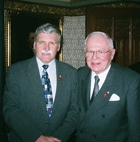 |
|
Senators Dallaire and Roche at the Ottawa launch of Global Conscience |
The Ottawa October 23 event was held at the Speaker’s Salon in Parliament, with Mr. Speaker Peter Milliken presiding, hosted by Senator Roméo Dallaire and with major political figures in attendance.
» Click here to read more about Global Conscience
» Receive a free copy of Global Conscience with your contribution of $100 or more to the Global Security Institute
» Read more about the Senator and his other 18 books on the subject of peace and disarmament
![]()
Bipartisan Security Group activities
Capitol Hill briefing: International Policies to Reduce Biothreats
On November 15, the Bipartisan Security Group (BSG) hosted a briefing on Capitol Hill entitled “International Policies to Reduce Biothreats.” Former Chief US Weapons Inspector in Iraq David Kay moderated a panel comprised of BSG expert Dr. Barry Kellman and Partnership for Global Security Executive Director Dr. Kenneth Luongo, as they discussed various policies, challenges and recommendations for strengthening the prohibition regime on biological weapons.
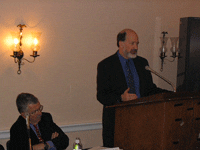 |
|
David Kay and Barry Kellman |
Over 45 representatives from 12 Congressional offices packed the Rayburn House Office room to hear these foremost experts on biological weapons offer specific policy recommendations, such as internationalizing efforts and rejecting unilateral approaches to biosecurity. There was consensus that while the US is doing great work in preparation for response to a possible attack, not enough is being done at home or abroad to halt potential attacks before they happen.
» Click here to read the full text of Dr. Kellman’s remarks
» Receive a free copy of Dr. Kellman’s new book, Bioviolence, with a donation of $100 or more to GSI
Reach to Space Conference
George Washington University, in co-sponsorship with a long list of commercial, governmental and academic partners, organized a massive conference on space commercialization November 12-13, 2007, entitled “Reach to Space.”
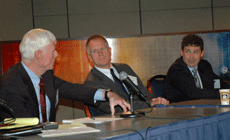 |
|
Ambassador Robert Grey, Jr. argues for a legal regime in space, on a panel with Michael Cook of Hughes Network Systems and Steven Apfel of Boeing |
BSG Director Ambassador (Ret.) Robert Grey, Jr. spoke to the hundreds of senior executives, business managers, journalists, aerospace engineers, IT consultants and project managers attending the prestigious conference, arguing that “our long-term national security interests would best be served by negotiating a treaty which effectively, legally, and verifiably bans the weaponization of outer space.”
While the other panelists extolled the emerging technological breakthroughs in space technology and the seemingly never-ending revenues to be reaped from their use, Ambassador Grey was the lone voice calling attention to the security implications of our proliferating uses of outer space and the increasing number of private actors entering the dark skies. The only way to ensure continued receipt of these revenues, Ambassador Grey maintained, is through a negotiated, legally-binding treaty protecting all of humanity’s access to space and prohibiting space weaponization.
» Click here for the full text of Ambassador Grey’s remarks
» Click here for more information about Reach to Space
![]()
Disarmament and Peace Education activities
Festival of Faiths
At the Festival of Faiths in Louisville, Kentucky, organized by the Center for Interfaith Relations (CIR) from November 8-11, GSI President Jonathan Granoff and GSI Board Member the Rev. Tyler Wigg Stevenson addressed a session focused on stimulating religious leaders to incorporate the moral imperative to eliminate nuclear weapons into their policies.
Other participants at the Festival included Archbishop Joseph Kurtz, Dr. Bill Vendley of World Conference on Religions for Peace, and Rev Sakai of Rissho Kosei-kai.
CIR regards their annual Festival as “a means to an end: the promotion of interfaith interaction and dialogue leads to interfaith understanding within communities and ultimately manifests itself in common action to address shared concerns.”
A video of this outstanding session will soon be available online.
» Read more about the Festival of Faiths
» Read “Addressing the nuclear threat,” op-ed by GSI President Jonathan Granoff, The Louisville Courier-Journal
Universal Forum of Cultures
Audrey Kitigawa and Jonathan Granoff at the UNESCO World Forum of Cultures
|
The World Wisdom Council recently met in consultation and presented at the UN Educational, Scientific and Cultural (UNESCO)- sponsored Monterrey Forum in Mexico. The Council’s members include GSI Board Advisors President Mikhail Gorbachev and Dr. Jane Goodall and other distinguished persons such as Wangari Maathai, Dr. Ashok Gangadean, and its founder Dr. Irwin Lazlo. With extensive media coverage, several round table dialogues and a closing session with about 1,000 persons, the Council’s concerns were effectively communicated.
The event was widely covered in the national media, including a widely cited article in El Seminario and an interview with Jonathan Granoff.
» Read the release from the press conference
» More information can be found at: https://www.monterreyforum2007.org/?lang=en
» More Information on the World Wisdom Council can be found at: https://www.clubofbudapest.org/wwc.php
30th Anniversary of the Jane Goodall Institute
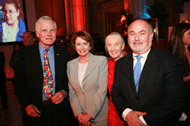 |
|
Alan Cranston Peace Award Recipients Ted Turner and Speaker Pelosi, with Jane Goodall and Jonathan Granoff
|
On October 10, 2007, the Jane Goodall Institute (JGI) celebrated its 30th anniversary. Dr. Jane Goodall, the renowned primatologist and United Nations Messenger of Peace, is an active member of the GSI Board of Advisors, as Jonathan Granoff is an active member of the Jane Goodall Institute’s Board of Advisors.
At the anniversary, Mr. Ted Turner, 2003 recipient of the Alan Cranston Peace Award, was honored with the Global Leadership Award for Responsible Activism in Media and Entertainment Award.
The Global Security Institute, which shares our New York office with the Jane Goodall Institute, offers its warmest congratulations and our best wishes for many more decades of activism and education.
» Read more about the Jane Goodall Institute
Children Uniting Nations
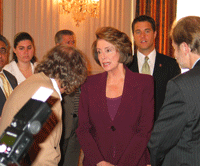 |
|
House Speaker Pelosi at the press conference |
Children Uniting Nations (CUN), a not-for-profit organization dedicated to the well being of at-risk youth, held a conference on October 17th in Washington, DC. Numerous members of Congress– such as Senator Evan Bayh, Congressman Adam Schiff, Senator Mary Landrow, Representative Loretta Sanchez, Rep. Richard Armey, fmr. Rep. Lee Hamilton, Rep. Ed Markey and Rep. Tom Lantos– participated along with Dr. Jane Goodall, deans of social work and education from America’s prominent research universities, including the University of Southern California, University of California Los Angeles, Harvard University and New York University, and CEOs of major Fortune 500 companies, all focusing on the educational needs of America’s underprivileged communities.
The event called on America and the world for immediate action to eliminate the pandemic of poverty, the lack of education and health care, and the threat of global radicalism.
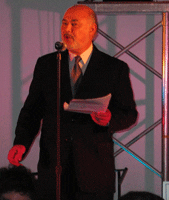 |
|
Mr. Jonathan Granoff introduces Senator Roméo Dallaire |
Mr. Granoff had the privilege of introducing Senator Roméo Dallaire, PNND Special Representative. His speech highlighted the need to effectively address the low- and high-technology immoralities of child soldiers and nuclear weapons, emphasizing how our tolerance of these two affronts to human dignity diminishes us all. House Speaker Nancy Pelosi, 2003 Recipient of the Alan Cranston Peace Award, opened the press conference.
American Bar Association International Law section Showcase Presentation with Jonathan Granoff and Bob Geldof
ABA International Law Section Chairman Jeffrey Golden, GSI President Jonathan Granoff and Bob Geldof
|
|
On October 5, 2007, Mr. Granoff, as Co-Chair of the Blue Ribbon Task Force on Nuclear Nonproliferation and Senior Advisor to the National Security Committee of the International Law Section of the American Bar Association, moderated a dialogue with Sir Bob Geldof during the October 3-7, 2007 American Bar Association Section of International Law’s Fall Meeting in London for a Special Showcase Presentation titled “Celebrity and Social Responsibility”.
Geldof is a musician, promoter, and activist who is internationally renowned for his work with both the Live Aid and Live 8 concert events, which promoted debt relief for Africa. He also works closely with DATA (Debt, AIDS, Trade, Africa), an organization founded by U2‘s Bono to advocate for Africa.In 2005 he received the prestigious Beacon Fellowship Prize for his leadership role in alleviating poverty, famine and genocide, especially in the Third World, and his advocacy for the rights of fathers. He was named a Knight of the British Empire by Queen Elizabeth in 1986.
Geldof discussed with Granoff the formative influences that have impacted his career and personal life, and the connections between social activism and the high public profile that celebrity creates, from his early childhood in Ireland to his work with Bono on debt relief in Africa, and what he saw as the critical issues for the future.
» Click here for a report and more photos from the ABA meeting in London
Albert Schweitzer’s Legacy: The Dangers of Nuclear Weapons
To commemorate Nobel Laureate Albert Schweitzer’s reverence for life and the 50th anniversary of his call to end nuclear testing, Quinnipiac University hosted a special conference September 26-27. Former President Jimmy Carter delivered the opening address.
The event culminated with a keynote presentation from Jonathan Granoff, followed by a dialogue with two hibakusha, or atomic bomb survivors, Kohta Kiya, Secretary-General of Hiroshima Atomic Bomb Survivors Network and Hirotami Yamada, Secretary-General of Nagasaki Atomic Bomb Survivors Network.
» Read “Nuclear Weapons and the Reverence for Life,”an excerpted chapter by Jonathan Granoff in the forthcoming volume, Reverence for Life: Albert Schweitzer’s Relevance Today, published by Cambridge Scholars Printing
» For more information on the Albert Schweitzer Institute, see: https://www.quinnipiac.edu/x153.xml
» For more information on the conference, see: https://calendar.quinnipiac.edu/NewEvents.aspx?id=56928
Civil Society Peace Forum
On September 8, 2007, GSI Senior Officer Rhianna Tyson spoke at a panel event at the historic Cooper Union in New York City, at a civil society peace forum organized by Sokka Gakkai International titled “Abolishing Nuclear Weapons: What Can Each of Us Do?”
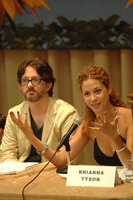 |
|
Tony Jenkins and GSI Senior Officer Rhianna Tyson at a Civil Society Peace Forum organized by Sokka Gakkai International, New York City, September 8, 2007 |

